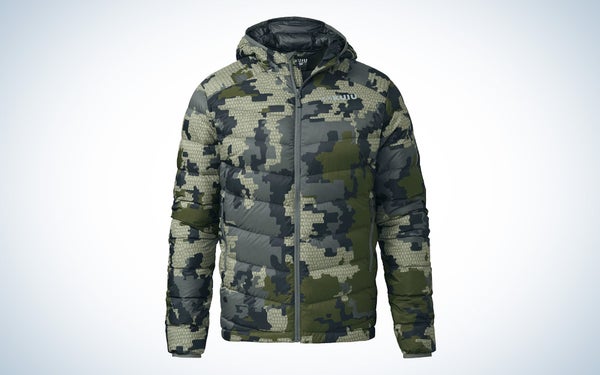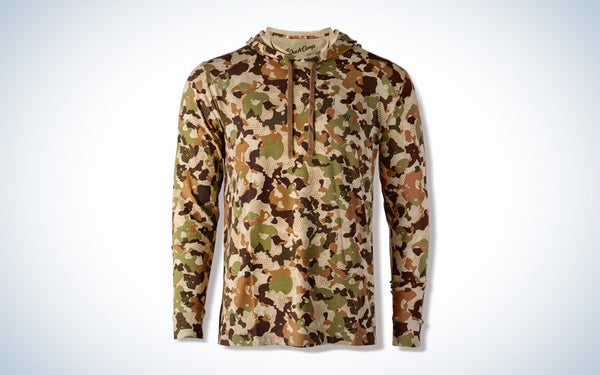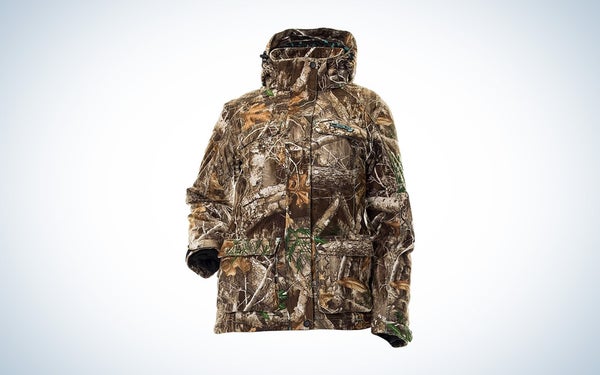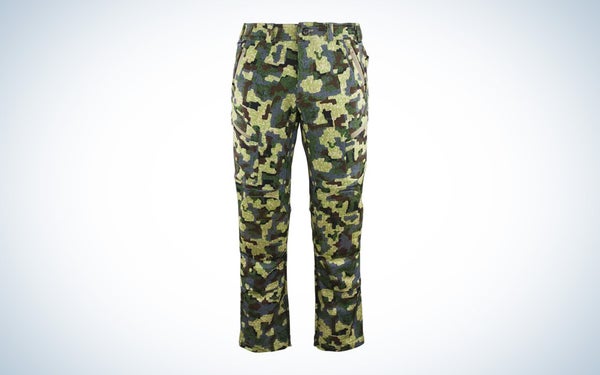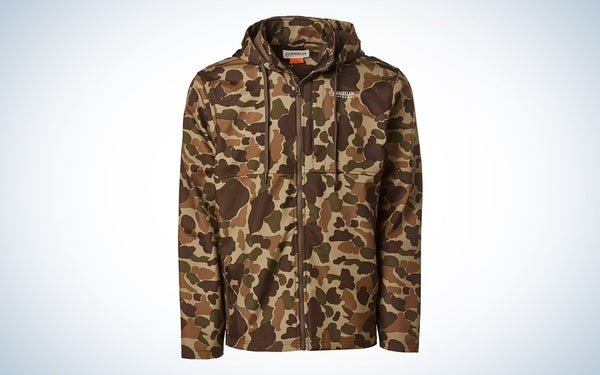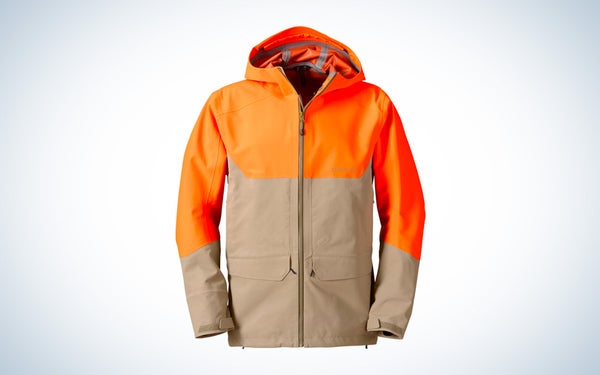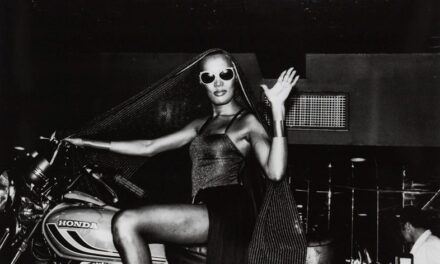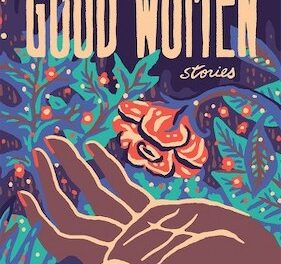We may earn revenue from the products available on this page and participate in affiliate programs. Learn more ›
Published Sep 28, 2023 9:00 AM
It’s safe to say that today’s hunting clothing brands are not the same ones our forefathers grew up wearing. There have been serious advancements in fabrics that allow clothing to be lighter, warmer, and more water-resistant than ever before. But the plethora of camo options can be overwhelming for newer hunters who are just getting started. Especially when weighing the options of budget vs. high-end hunting clothing. That’s why we’re here to help.
We spend a lot of time in the woods wearing a variety of camo from different hunting brands. This in-the-field testing has helped us narrow down the best of the best when it comes to pursuit-specific hunting clothing. And while camo and clothing choices are subjective based on location, climate, and species, there are some companies that just make better products. Each of the brands below has been tested extensively by F&S staff. Thus, you can hunt with confidence this fall in our picks of the best hunting clothing brands.
How We Chose the Best Hunting Clothing Brands
I tested many of the brands on this list myself and consulted with other F&S staff members to get their favorite options from the last few seasons. We have taken the clothing mentioned below on hunts all across the country in various weather conditions. And we only considered brands that we tested in the field. Note that because we focused specifically on clothing brands, we left off some big names like Mossy Oak or Realtree. That was because those two tend to focus on licensing their patterns rather than making their own branded clothing.
From the hot days of dove season in Texas to the bitter cold of late deer season in Michigan, and elk hunts at high elevation, we have subjected the tested brands to some of the toughest conditions possible. We noted the comfort, fit, breathability, insulation, water resistance, and camouflage of each garment.
Additionally, I considered the following factors when making my final picks:
- Material: What is the main fabric used in the clothing? What type of insulation does the brand use? Is it breathable?
- Components: What types of zippers, buttons, and other fasteners does the clothing utilize? Are they prone to breaking or sticking?
- Camo Patterns: How effective are the designs? Are the patterns detailed or open in concept?
- Value: Does the price point match the performance of the clothing?
Best Hunting Clothing Brands: Reviews and Recommendations
Best Camo Patterns: Kuiu
Specs
Pros
- Great stitching and components
- Versatile, effective patterns
- Extremely lightweight
Cons
Kuiu is a premium hunting clothing brand, and they have become my go-to over the last few seasons. Specifically, their Super Down and Proximity lineups of clothing. I wore my Proximity jacket and pants last year when I harvested a non-typical Michigan 9-pointer from the ground with my rifle. And it is my top pick for best original camo patterns. Their Valo and Verde patterns have also both helped me harvest deer here in the Midwest. And I’ve won several of those dreaded hunter/mature doe standoffs while wearing Kuiu.
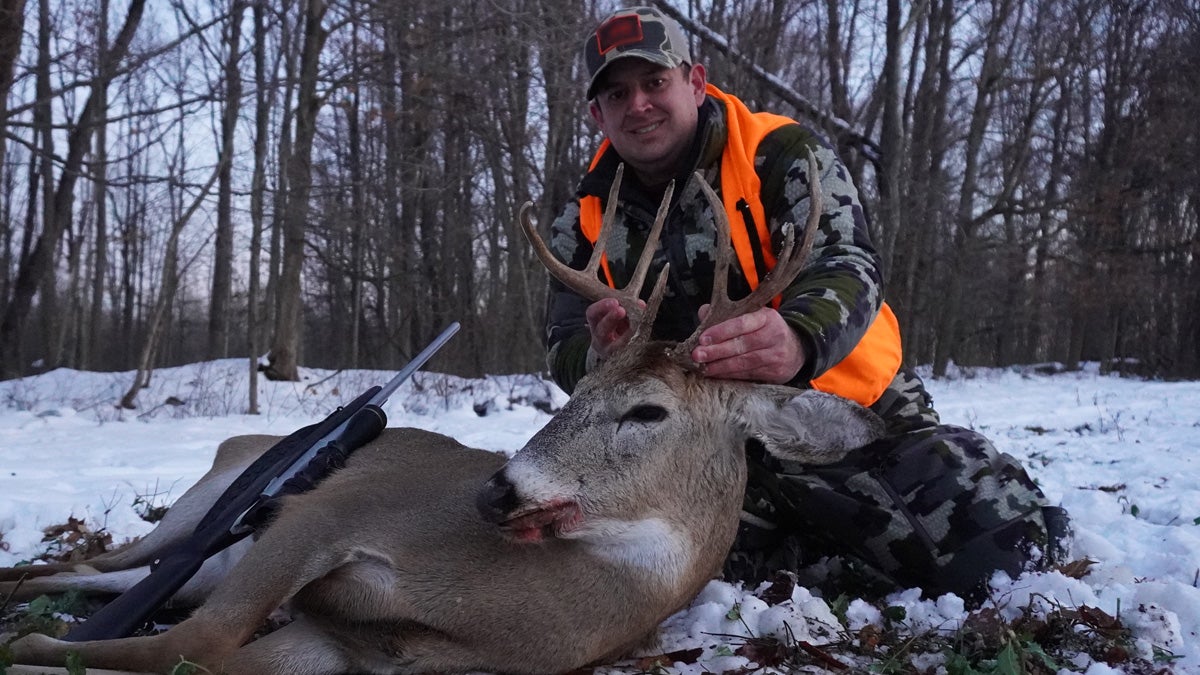
Their Proximity line is specifically designed for stand hunting. And Kuiu just introduced another stand-specific line with their new Encounter pattern. That camo is designed for the early and mid-seasons. Then there’s the Super Down line. I’ve hunted from a stand with it, but it is better suited for a spot-and-stalk-style hunt in a windy western state. It is extremely warm while remaining lightweight, like all of Kuiu’s insulated patterns.
Kuiu clothing is expensive, but worth it for serious hunters who spend a lot of time in the woods. Kuiu has traditionally been a western big game hunting brand, but that is changing. Both with their Proximity line and with the introduction of a new waterfowl lineup this year.
Most Versatile: Sitka
Specs
Pros
- Extremely high quality
- Excellent patterns
- Great durability
Cons
Sitka makes premium big game, whitetail, waterfowl, and turkey hunting clothing. Their unique camo patterns have grown in popularity over the last decade due to the quality of materials and available layers that work as a system to maximize comfort. Sitka’s layering system is what makes their gear so useful, and tailoring each garment to work another will improve your experience in the field.
I wear Sitka for all of my hunting pursuits—big game, whitetail, waterfowl, turkey—and strategically use each layer with a purpose. My early-season archery elk system features a 220 merino wool top and bottom baselayer, an Intercept pant, an Intercept hoody, an Ambient jacket, and an Aerolite jacket—all in subalpine camo. This system allows me to stay comfortable in conditions ranging from 30 degrees all the way up to 75 degrees.
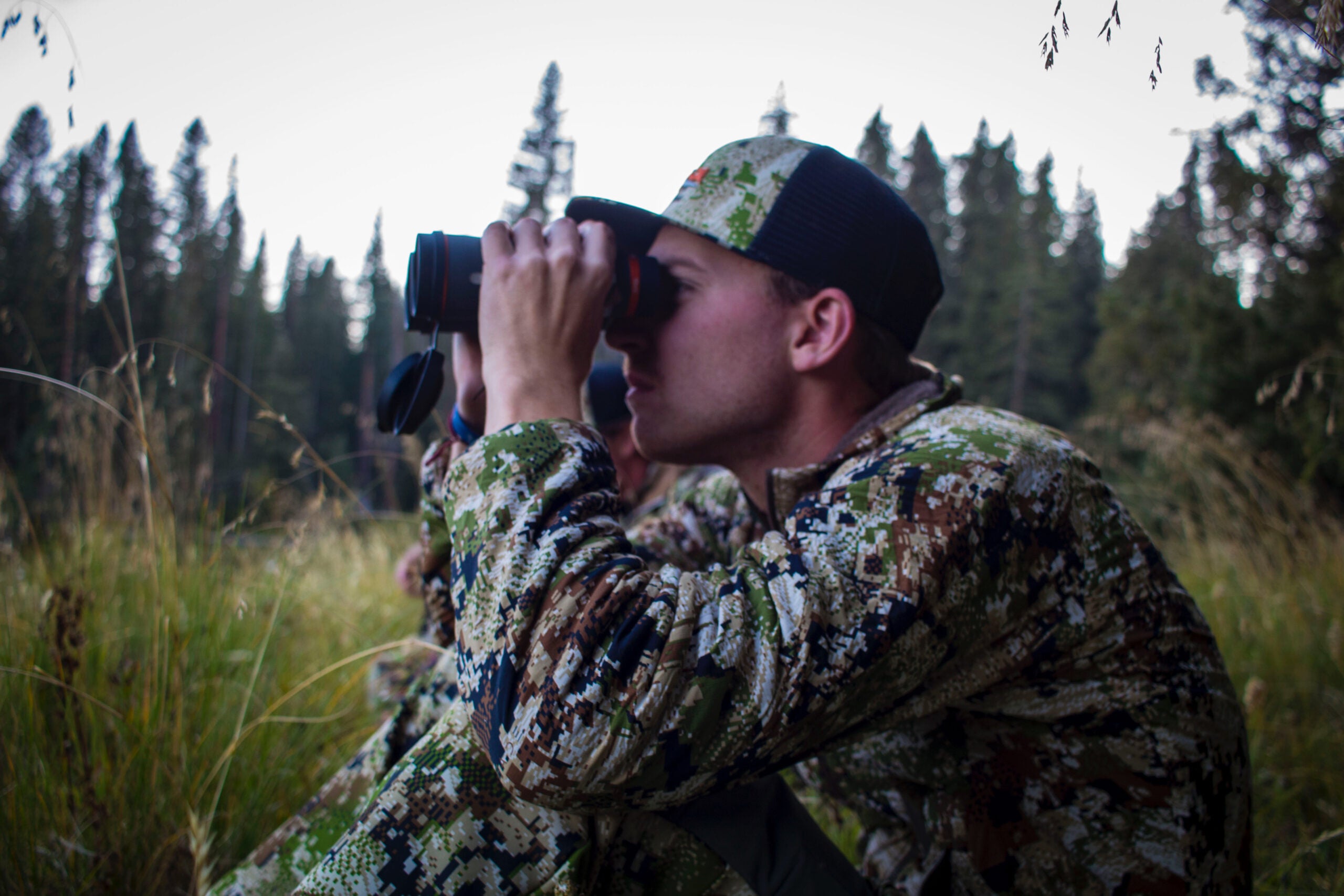
For waterfowl, I have an extensive layering system to last me from early season teal to late January mallards. The temperature fluctuations I face across a waterfowl season range from below zero up to 80 degrees. But for most waterfowlers, I recommend starting with a Dakota hoody and building a system around it. The Dakota serves as my outer layer for the majority of the season until temperatures seriously start to plummet, and then I add on a Duck Oven or Hudson jacket. Other great pieces of Sitka waterfowl gear include the Delta Wading jacket, Ambient hoody, Delta Waders, and Hudson Bibs.

Whitetail hunters will want to check out the Fanatic and Stratus systems in their Elevated II camo. All of these tops and bottoms are very comfortable, quiet, and warm. Of course, adding on more general layers like the ambient jacket and merino baselayers will also help improve comfortability in the field. But be sure to match your camo and insulation to the location you hunt. —Ryan Chelius
Most Comfortable: Duck Camp
Specs
Pros
- Unbelievably comfortable
- Great for casual wear
- Excellent construction and attention to detail
Cons
- Line is somewhat limited to bird hunting at the moment
Duck Camp is a brand I only recently became familiar with, but they’ve quickly won me over as a fan. Mainly because the quality and attention to detail are off the charts with their garments. It’s the little things like the stitching on the seams, the pulls on the zippers, and the versatility of their garments. For instance, I’ve been frequently wearing the Barnburner Merino hoodie—not just for hunting but also around the house as fall starts to roll in in the Midwest.

Another item I’ve been testing is their Tracker pants. It’s made of a double-weave nylon twill that I’ve found to be very durable thus far. And the solid waistband won’t dig into your hips even while wearing it for long periods. The plethora of pockets is another bonus when you carry as much gear as I do. Their Drifter pants and Brush pants are solid options for upland.
But the best thing about Duck Camp is that they make quality hunting gear and great lifestyle options. They offer the best of both worlds, and the gear is sharp and stylish for a variety of casual scenarios. The DryDown reversible jacket is a perfect example of a piece that can be used for hunting and everyday wear. It’s light, warm, and can be turned completely inside out depending on the situation. It adds a ton of functionality for the garment beyond just the duck blind.
Best for Women: DGS Outerwear
Specs
Pros
- Designed by women for women
- Options for nearly every style of hunt
- Functional
Cons
- Occasional reported inconsistency in sizing
When I asked our Executive Gear Editor, Amanda Oliver, about her top brand for women’s hunting clothing, she didn’t hesitate to name DSG Outerwear. The name is short for “Doing Something Great.” The founder, Wendy Gavinski, quickly found success in the niche world of hunting clothing because she set out specifically to offer functional equipment designed by women for women. Their Kylie line is arguably their most popular, with jackets like the 3-in-1 cold climate being a top seller. The jacket is windproof and waterproof. As a bonus, DSG sells this jacket in popular camo patterns like Mossy Oak and Realtree.
DSG has a heavy focus on warm-weather clothing options, with offerings like the drop seat hunting bib of the Kylie line proving to be extremely popular. However, there’s a great deal of versatility in their line too.
For example, the company offers some rather unique options for women’s upland vests, pullovers, pants, and jackets. They also offer solid options for waterfowl like the Nova Rain Jacket and pants. This brand has won over legions of female fans in its short 13-year existence. And when you consider women are one of the only growing groups in terms of hunter participation, it’s surprising more companies aren’t trying to do what DSG is excelling at.
Best Made in the U.S.A.: Forloh
Specs
Pros
- Extremely versatile line
- Made in the U.S.A.
- Extensive women’s offerings
Cons
- Some odd tag placements on some garments
If you’re a stickler for buying American, you’ll find a lot to like with the Forloh line. It’s one of those brands that flies a bit under the radar. They have an incredibly versatile line with men’s and women’s options across all their products—and one of the more extensive offerings for women that we’ve seen. My personal favorite is the Insect Shield SolAir hooded long sleeve shirt, which I’ve been using extensively for a few years now, and not just for hunting. My biggest test for this shirt came on a fishing trip to Costa Rica. The shirt completely protected me in the bug-filled Central American jungle. I also thoroughly soaked it in fish slime and tuna blood on that trip, which held up to the abuse and came out in the wash. It’s one tough garment.
More recently I’ve been testing their Deep Space base layer shirt and bottom. I’ve also been testing their Allclima stretch woven twill pants, both of which are very comfortable. The shirt and bottom are a slim fit on me, but not one that’s too tight or constrictive. The silicone waistband on the Allclima pants is incredibly soft and doesn’t dig into my skin like some other pants I own. I found the pockets easy to use thanks to the quality YKK zippers, and the locations are excellent.
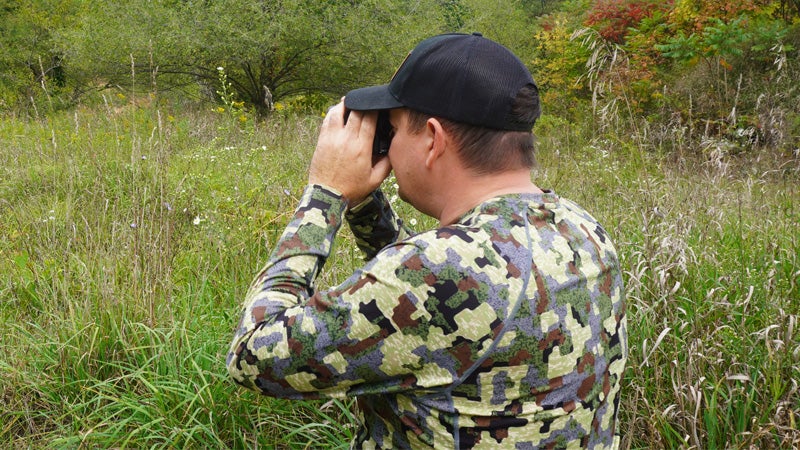
Best Budget: Magellan
Specs
Pros
- Affordable
- Solid quality
- Many original and name-brand camo pattern options
Cons
- Line skews slightly more towards lighter, warm-weather gear
Being from Michigan, I wasn’t super familiar with Magellan, which is an Academy Sports house brand, until recently. However, after getting the chance to test some of their gear on some hot weather Texas hunts, I came away impressed by what they’re offering. My first hunt was a sweltering mid-September sit for doves in a sunflower field in 95-degree temperatures with no shade. I wore their new Eagle Pass Tech hooded long sleeve. It’s made of a 90/10 percent polyester and spandex blend that’s nice and airy for humid hunts like that one. More importantly, it kept me from getting a nasty sunburn as I waited for birds. And at under $40, it’s a bargain.
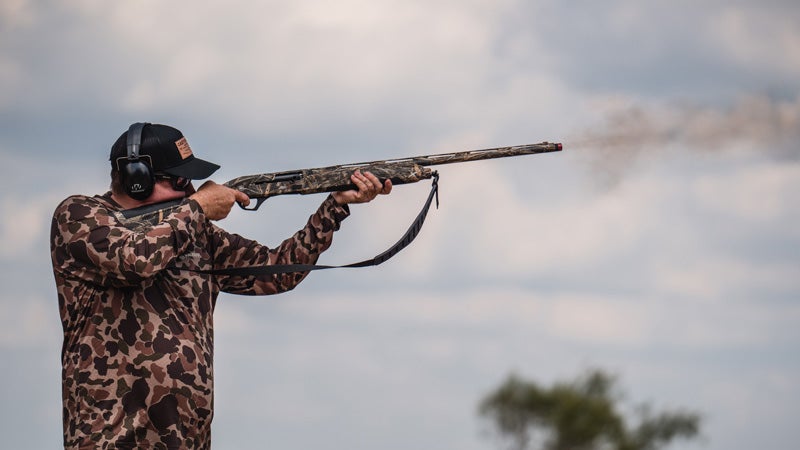
Magellan also offers a full lineup of hunting pants. Popular options include their Stonewell 7-Pocket Twill pants and their ripstop pants. I wore a pair of their Hickory Canyon cargo pants on the dove hunt and later on a teal hunt. They fit perfectly and were surprisingly comfortable and durable. Hard to believe for pants that only cost $30.
Because Academy is primarily a Texas-based brand, I found their line does tend to skew slightly towards lighter, warmer weather clothing. They do have some insulated items like the Ozark waist jacket, but southern hunters will probably find more use here than northerners. Much of Magellan’s line is ideal for beginners just building up a starter wardrobe of hunting outfits. I also just love the fact they’ve got both their own original, and popular licensed camo patterns like Mossy Oak and Realtree in their offerings. No matter what your preference on camo, you’re likely to find it here.
Best For Upland: Orvis
Specs
Specs
- Best Seller: Perfect Flannel Shirt
- Our Favorite: LT Pro System
- Price Range: $80 – $400
- Best Use: Upland, waterfowl
Pros
- Great wind protection
- Excellent customer service
- Nice variety for varying weather conditions
Cons
Orvis is the brand of choice for our Senior Editor, David Schlake, who is a diehard upland bird hunter. The kind who regularly travels a thousand miles across five states just for a shot at a quail or pheasant. For poor weather conditions, his clothing of choice is the Orvis ToughShell line. The jacket uses heavy-duty waterproof fabric that keeps mother nature’s worst from interfering with your hunt. The ToughShell pants have that, and some serious reinforcements in the knees and lower legs. These are perfect for dense patches of thorns and briars where pheasants and other upland birds love to hide.
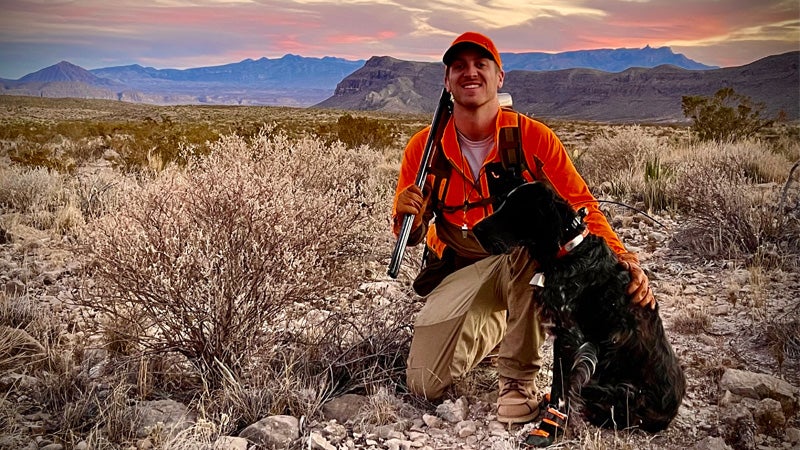
Because he lives in Texas, and temperatures routinely soar during hunting season, Schlake told me he turns to the Pro LT line. Shirts like the Pro LT are made of a nylon/spandex blend that stays lightweight and airy while sweating it through the underbrush. Orvis also builds in some odor control to keep things fresh over the course of a multi-day hunt. The Pro LT line’s Underwader Pants have an excellent inner lining made of fleece that will stay warm and wick away excess sweat while chasing ducks and geese in heavy chest waders.
Orvis also makes some excellent softshell jackets and vests. They also offer hoodies and mid-layer bottoms in popular optifade camo patterns that are great for waterfowl. Finally, Orvis makes some excellent upland hunting vests in both classic and strap styles that add extra visibility and functionality. One vest, the Pro Upland vest, features a whopping 35l of storage space for serious uplanders who carry a ton of gear.
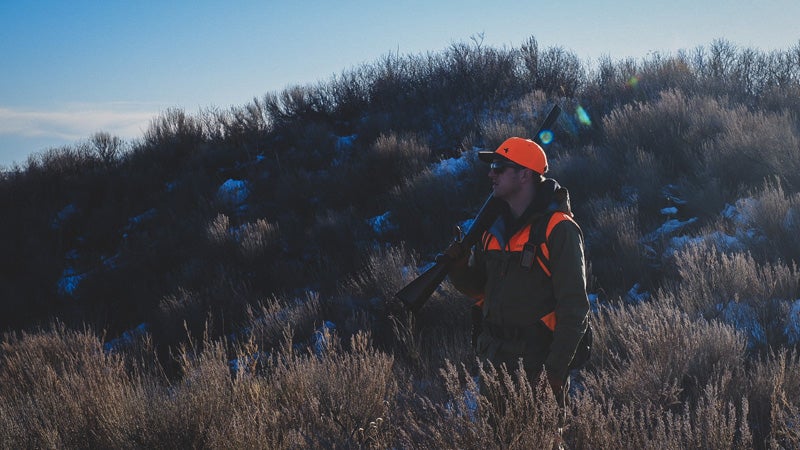
What to Consider When Choosing a Hunting Clothing Brand
While you can buy only one hunting jacket and call it good for your area, most hunting clothing today is very case-use specific. Different camo patterns are designed for different types of terrain and vegetation. Some patterns are open with lots of greys and browns, and other patterns might feature a tighter tan and light green camo pattern for up-close encounters.
Some clothing will be thin and breathable for hot weather, while other garments will feature heavy-duty insulation for cold hunts. And some hunting clothing is designed to be dedicated baselayers. Outer layers are usually much more rugged and thicker for extra protection from bad weather.
Insulation and Materials
When hunting in colder weather, insulation and materials become important. Synthetic insulation is by far the most popular these days. The biggest benefit to it is the fact that it dries quickly. That’s important for those hunts in the rain or snow. The downside is that it often has a shorter lifespan than some other materials.
Down is another popular insulation choice because it is lightweight and extremely warm. However, unless it has a weatherproof outer shell protecting it, it’s not ideal for wet weather. Unfortunately, it takes an extremely long time to dry.
Wool provides excellent insulation and breathability. It’s also extremely quiet but comes at a higher price point. Fleece is also a popular material because of the comfort it offers. But it doesn’t handle wind very well.
Most hunting clothing today is a composite of different materials to add strength in areas of stress. Many manufacturers now offer reinforced knee areas in their hunting pants. At the same time, they’ll often add more insulation in areas that typically experience heat loss.
FAQs
Q: What is a hunter’s most important clothing?
The most important clothing depends greatly on the scenario. However, the outer layer is usually the most important because it is the first line of protection from the elements. If hunting in wet conditions, the layer should have some waterproofing. If you are hunting during firearms season, some degree of hunter orange is also important for safety reasons.
Q: Can you hunt in jeans?
Jeans are not usually ideal for hunting. The exception is if you’re doing something extremely casual, like hunting for doves. Unless you’re sitting in a ground blind, jeans can be a detriment due to the color. Deer and other ungulates see blue better than other colors. It’s like putting a giant neon sign on yourself saying, “there’s a hunter here.” The bigger downside to jeans is that they simply aren’t as warm as dedicated hunting pants. They will also take an extremely long time to dry if they get wet.
Q: What is the best color for hunting?
This again depends on the scenario. White is not ideal unless you are hunting in the snow because game animals see white extremely well. Depending on the region of the country you are hunting, and the time of year, browns, greys, and greens are usually best. Clothing with a pattern to break up the hunter’s outline can be helpful for hiding from the prying eyes of deer and other big game.
Best Hunting Clothing Brands: Final Thoughts
In truth, it’s too hard to pick the best overall out of this batch of contenders. These brands have each proven to produce quality clothing for a variety of styles and scenarios. To the point where we’re wearing a little bit of everything year in and year out. But whether you’re looking to buy your first set of hunting clothing or your hundredth, it’s hard to go wrong with any of these brands.
Why Trust Us
For more than 125 years, Field & Stream has been providing readers with honest and authentic coverage of outdoor gear. Our writers and editors eat, sleep, and breathe the outdoors, and that passion comes through in our product reviews. You can count on F&S to keep you up to date on the best new gear. And when we write about a product—whether it’s a bass lure or a backpack—we cover the good and the bad, so you know exactly what to expect before you decide to make a purchase.

